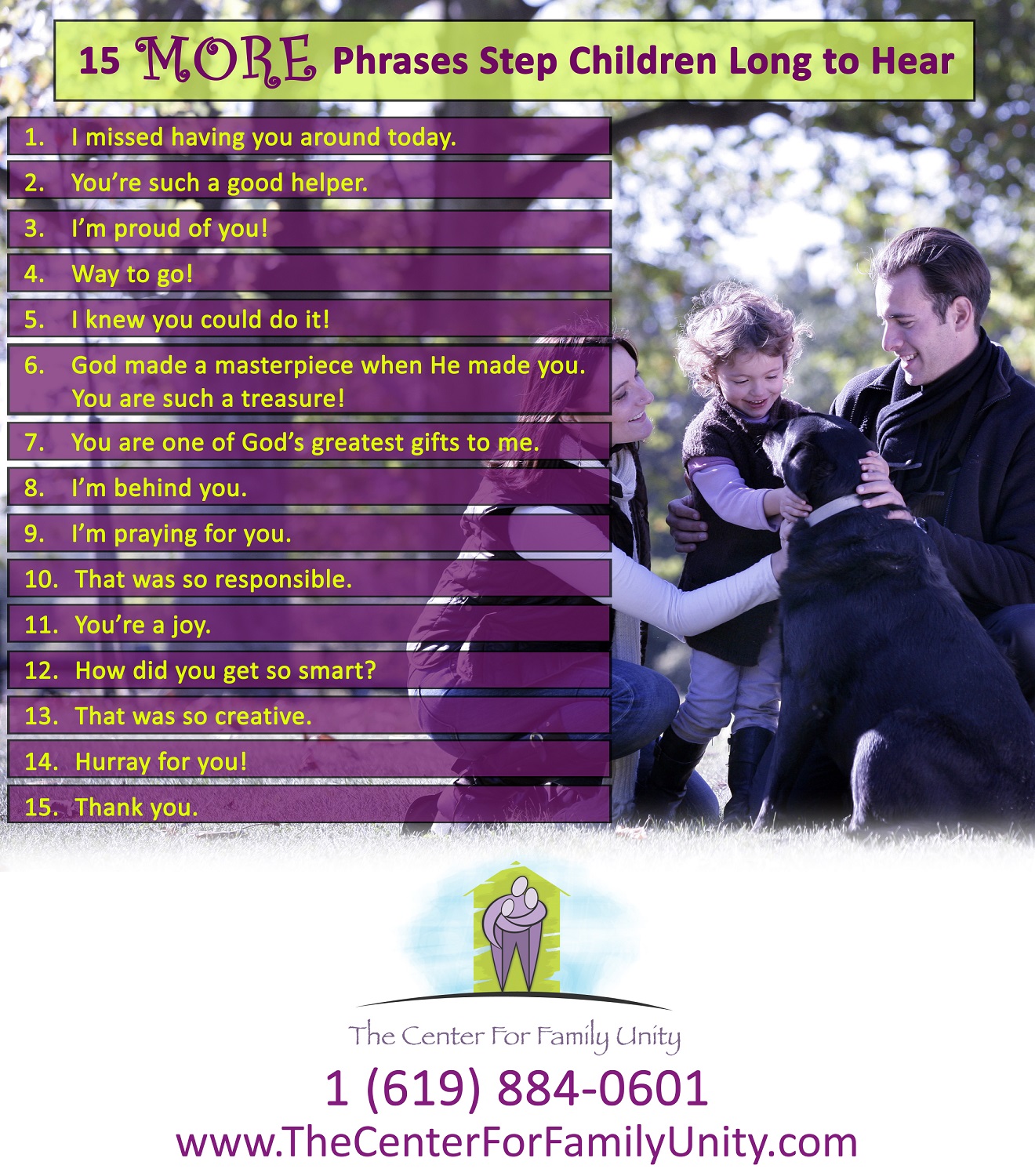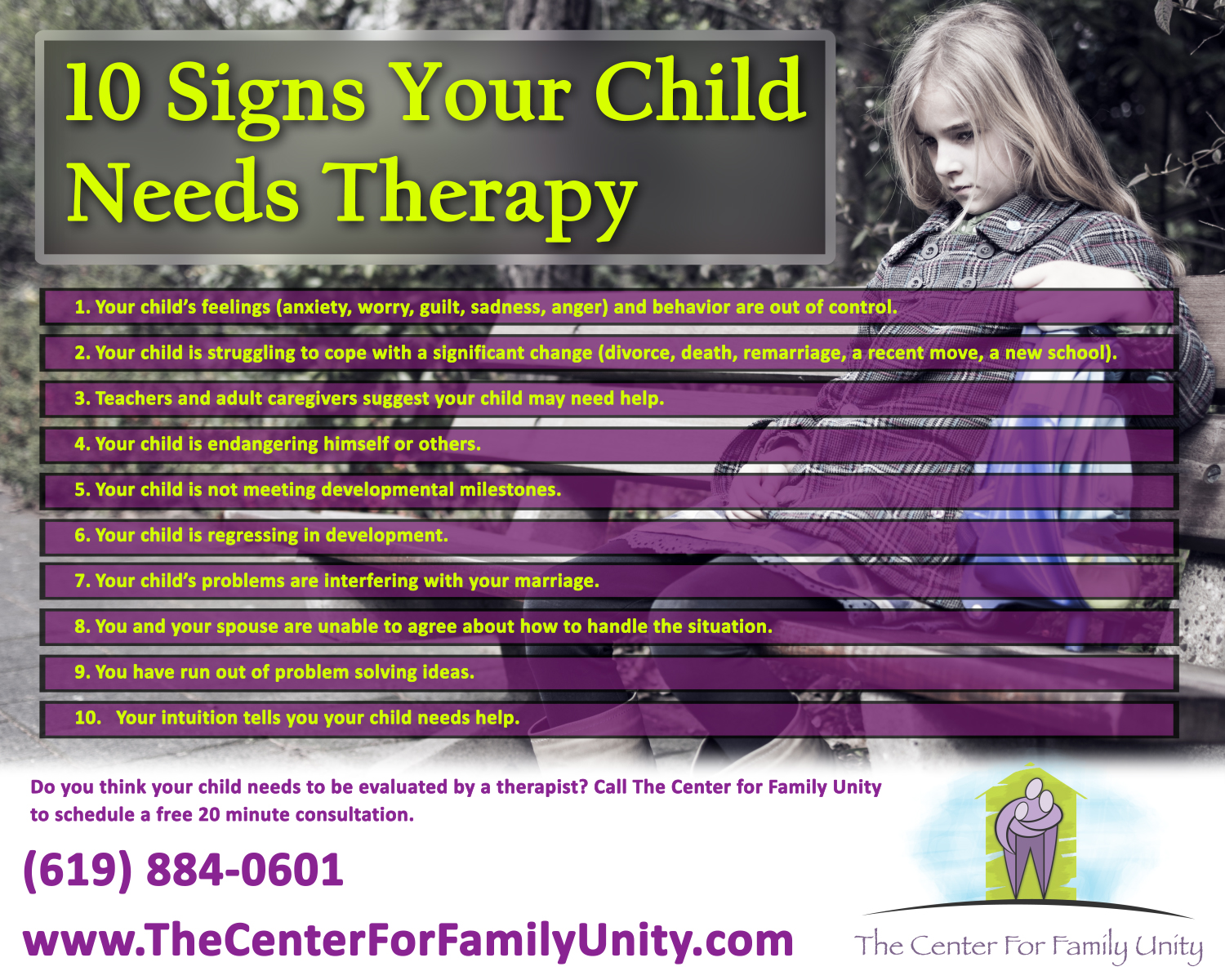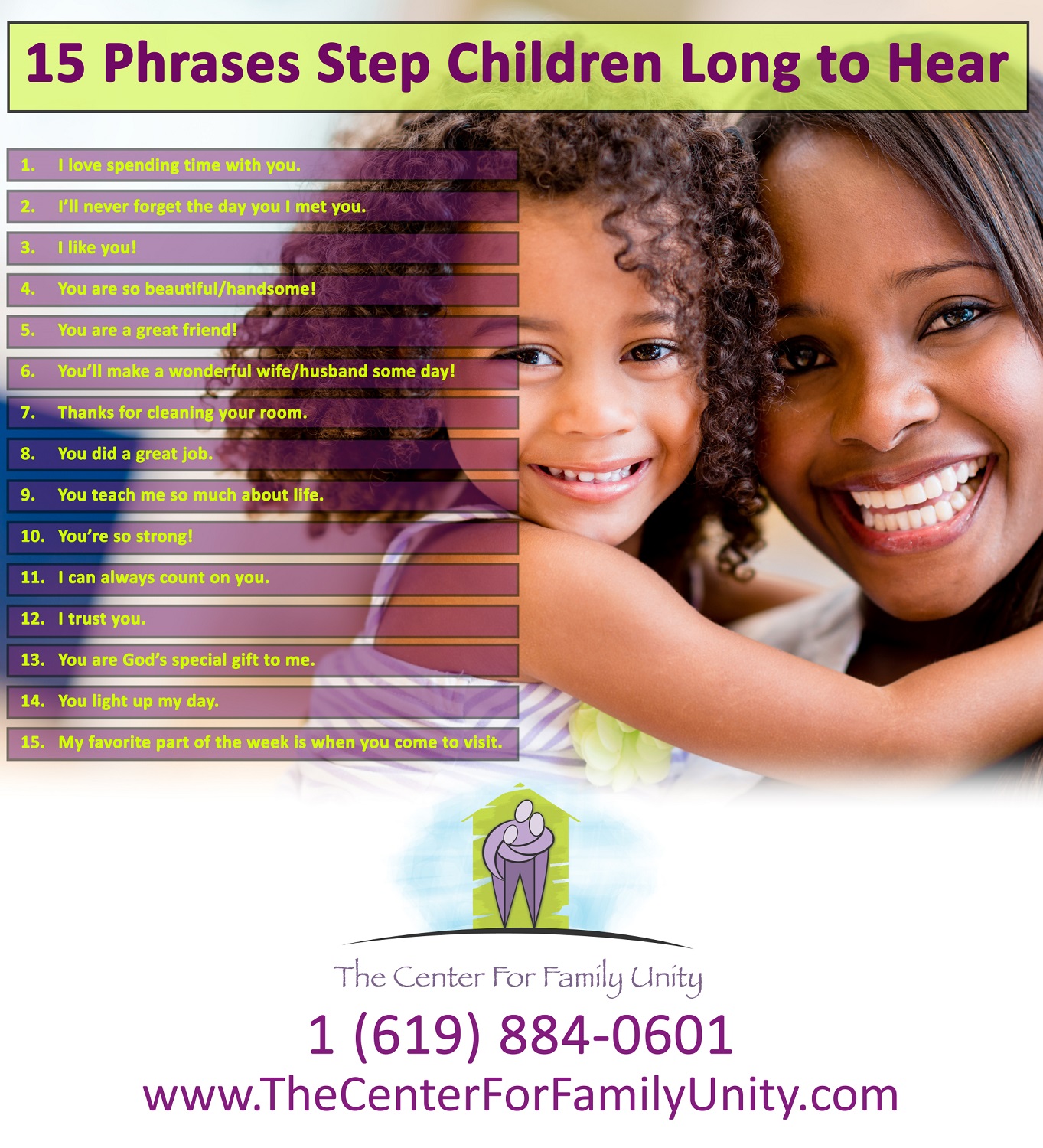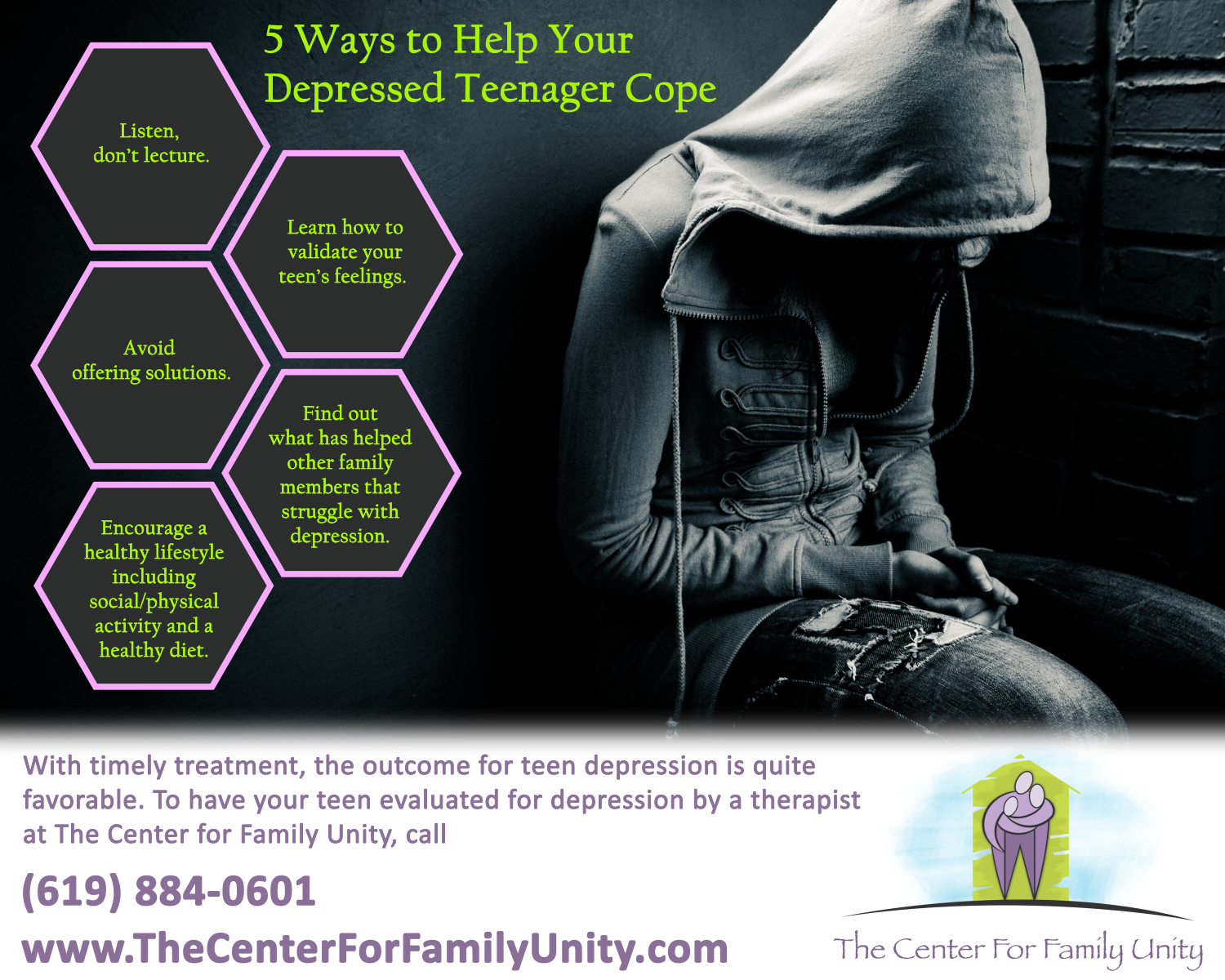by admin | Jun 13, 2015 | Children Therapy, Family Counseling

15 MORE Phrases Step Children Long to Hear
- I missed having you around today.
- You’re such a good helper.
- I’m proud of you!
- Way to go!
- I knew you could do it!
- God made a masterpiece when He made you. You are such a treasure!
- You are one of God’s greatest gifts to me.
- I’m behind you.
- I’m praying for you.
- That was so responsible.
- You’re a joy.
- How did you get so smart?
- That was so creative.
- Hurray for you!
- Thank you.
For more in-depth help with communicating with your step children, contact the step family therapists at the Center For Family Unity today.
by admin | Jun 13, 2015 | Children Therapy

10 Signs Your Child Needs Therapy
- Your child’s feelings (anxiety, worry, guilt, sadness, anger) and behavior are out of control.
- Your child is struggling to cope with a significant change (divorce, death, remarriage, a recent move, a new school).
- Teachers and adult caregivers suggest your child may need help.
- Your child is endangering himself or others.
- Your child is not meeting developmental milestones.
- Your child is regressing in development.
- Your child’s problems are interfering with your marriage.
- You and your spouse are unable to agree about how to handle the situation.
- You have run out of problem solving ideas.
- Your intuition tells you your child needs help.
Do you think your child needs to be evaluated by a therapist? Contact the Center for Family Unity to schedule a free 20 minute consultation.
by admin | Jun 13, 2015 | Children Therapy, Family Counseling

15 Phrases Step Children Long to Hear
- I love spending time with you.
- I’ll never forget the day you I met you
- I like you!
- You are so beautiful/handsome!
- You are a great friend!
- You’ll make a wonderful wife/husband some day!
- Thanks for cleaning your room.
- You did a great job.
- You teach me so much about life.
- You’re so strong!
- I can always count on you.
- I trust you.
- You are God’s special gift to me.
- You light up my day.
- My favorite part of the week is when you come to visit
Want more in-depth help communicating with your step children? The blended family counselors at The Center for Family Unity can help. Contact us today to schedule a free 20 minute consultation.
by admin | Jun 13, 2015 | Children Therapy

5 Ways to Help Your Depressed Teenager Cope
- Listen, don’t lecture.
- Learn how to validate your teen’s feelings.
- Avoid offering solutions.
- Find out what has helped other family members that struggle with depression.
- Encourage a healthy lifestyle including social/physical activity and a healthy diet.
With timely treatment, the outcome for teen depression is quite favorable. To have your teen evaluated for depression by a therapist at The Center for Family Unity, contact us today.
by admin | Jun 13, 2015 | Children Therapy
Are you concerned your teen might be depressed? Depression affects people of all races, genders, and ages—including teens. Depression is a treatable illness; however, parents must know how to recognize the signs of teen depression and when to intervene.
It’s normal in the teen years to have highs and lows, but having a bad day is quite different than having a bad month. When a teen is stuck at a low point, you need to pay attention. A depressed teen is unable to “snap out of it” and pull themselves up by their boot straps. The depth of their feelings can be overwhelming. In the worst case scenario, untreated depression can result in suicide.
The National Institutes of Health (NIH) reports about 1 in 5 teenagers have depression at some point. The signs of depression in teens are different from the signs of depression in adults. Adults often describe themselves as being depressed or down in the dumps. Teens are not as likely to use words like sad or depressed to describe their experience. They are more likely to indicate they are depressed by changing their behavior and daily routines. If you see some of the following common signs of teen depression in your child for 2 weeks or longer, call The Center for Family Unity for an evaluation.
- Frequent irritability or hostility with sudden out bursts of anger.
- Spends increasing time alone, pulls away from family and most friends, while keeping a close friend.
- Doesn’t enjoy or participate in activities that brought pleasure in the past.
- Appears sad and depressed most of the time to others.
- No longer shows interest in personal grooming.
- Complains of being tired much of the time.
- Sleep patterns change – insomnia, fitful sleep, or sleeps most of the time.
- Eating patterns change – gains weight, or loses weight instead of normal gain with growth.
- Very sensitive to criticism, feels worthless, hopeless, has inappropriate guilt.
- Has a hard time concentrating or following directions, and cannot make decisions.
- GPA drops, fails to do homework, and has no motivation concerning school.
- Has unexplained physical symptoms i.e. headache, stomach ache.
- Absent from school.
- Engages in high risk behaviors i.e. unsafe sex, shoplifting, and reckless driving.
- Engages in drinking or using drugs to deal with feelings of depression.
Remember, depression is a treatable illness. To learn more about how to recognize the signs of teen depression and know when to intervene, contact a teen therapist at The Center for Family Unity by calling (619) 884-0601.
by admin | Jun 13, 2015 | Children Therapy, Family Counseling
In order to function well at work and in your relationships, you need to know your children are doing well, and that their needs are being taken care of. Here are ten strategies that will help you ease the transition for your children in your newly blended family.
- Tell your children up front that their step parent is not there to replace their biological parent. Reassure them their biological parent will always be their mom or dad and that there is no expectation to call their new step parent mom or dad.
- Let your children know it’s okay if they don’t love their step parent like you do. Nevertheless, they do need to treat them with respect. The same is true for their step siblings.
- Plan regular parent-child dates with your biological children. And don’t ever cancel! Give them your precious time—your undivided attention. It can be as little as 15 minutes a day, but it must be consistent. While buying them new toys or planning fancy trips may seem like a way to show your love for them, it cannot ever replace you. Your kids want you. Be there.
- Help your kids understand the non-negotiable behavior rules of your home by placing them in a prominent area. Let them know they will be disciplined if they break these rules and that your new spouse will discipline them if you are not home to do it.
- Give everyone time and space to form new relationships. Don’t force the family to do everything as a family unit. Too much forced togetherness backfires.
- Keep your own expectations realistic. Building a secure blended family takes years of commitment. The effort you put into your relationship with your step children may take years to fully develop.
- Learn about gender differences. General research shows girls have more difficulty accepting step fathers than boys, and girls are more uncomfortable with a step father’s physical affection than boys. Girls may also express dislike of their step mother, picking up the biological mother’s anger, and acting in solidarity with her. This behavior dissipates if the biological mother tells the daughter being angry and disrespectful to the step mother is not an option.
- Learn about affection. Both girls and boys prefer verbal affection over hugs. If the kids are shying away from physical touch, give them the space they need.
- Find something each child is doing right and encourage them. Tell them how much you respect or appreciate the fact that they do this or that. Write them a note that tells them how much they mean to you and sneak it in their lunch box. Send them an unexpected text during the day recognizing them for something they’ve done well. Be creative and let them know you noticed.
- Accept the reality that it is normal to love your own biological children more that your step children, even when your intention is to love them as your own.
Therapists at The Center for Family Unity can help you strengthen the bonds in your blended family and ease any transitions you may be struggling with. We invite you to book a free 20 minute consultation on our website. Contact us today.












